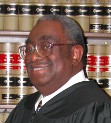Reprinted with permission from the Federal Bar Association, New Orleans Chapter
The Advocate, Winter edition 2014 Vol. 23, No. 2
by Brian Capitelli

The name Louis Moore is well known to criminal law practitioners in the Eastern District of Louisiana. Judge Moore handled the criminal magistrate docket in this district for over the last two decades. He began his career as a Federal Magistrate Judge in 1985 and retired last year. He was appropriately suited to handle the criminal docket given his extensive experience both as a prosecutor and criminal defense counsel. Judge Moore was known by all, for his booming voice, which could fill the court room, and for his patience and humble demeanor to all who came before him.
Judge Moore was born and raised in Bogalusa, Louisiana. He was one of five children and the son of a mill worker at the Crown Zellerback Paper Plant. His father was very active in the union at the paper plant. Growing up in Bogalusa molded not just his outlook on life but also his approach to the practice of law. During his formative years, he distinctly recalls the numerous civil rights law suits that were filed and resolved in Federal Court in New Orleans. These lawsuits spurred his interest in Federal Court where he believed people had more confidence in the court system. His home town was "a hub for the civil rights movement" as he points out. Throughout his career, Judge Moore was recognized by the Louis A. Martinette Legal Society for his contributions to the law in the area of civil rights.
Throughout his undergraduate career and law school years, Judge Moore was very active in voter education and registration drives in the African American community. Part of his motivation for this was the efforts he witnessed by others specifically those in the church community in Bogalusa. He was particularly touched by the efforts to register to vote undertaken by one of the deacons in his church who was blind. Watching the difficulties and hurdles that this blind deacon went through to register to vote stood out for a young Louis Moore. As Judge Moore put it "if a blind man can go to vote, everyone should do it."
Judge Moore entered law school in 1969, which he described as "an exciting time", where anything was possible. Judge Moore worked for the New Orleans Legal Assistance Corporation ("NOLAC"), as a law clerk helping out with civil cases which included, among other things, obtaining social security benefits for indigent clients. He also worked as an investigator with the New Orleans Indigent Defender program. In January 1973, he began his legal career with the Orleans Parish District Attorney's office under then District Attorney Jim Garrison and his First Assistant, John Volz. He had a successful career as a prosecutor with the DA's office working there for several years until John Volz became the Public Defender in the Eastern District of Louisiana. Judge Moore was handpicked by Mr. Volz to work as one of his Assistant Public Defenders. He worked with Mr. Volz at the Public Defender’s office until Mr. Volz was appointed as the United States Attorney in the Eastern District of Louisiana in 1978. Judge Moore moved on with Mr. Volz to the US Attorney's office where he worked for seven years and became Deputy Chief of the Criminal Division. During his career as an Assistant United States Attorney, Judge Moore was known for his powerful closing arguments. Judge Lance Africk, who was Criminal Chief during Judge Moore's tenure at the US Attorney's office described Moore's closing arguments as "half preacher and half prosecutor". Judge Africk remembers that attorneys from the United States Attorney’s office would file into the court room just to hear Judge Moore's powerful closing arguments. Judge Africk remembers that during his closing arguments "the words would dance off the page" when Louis Moore delivered his address to the jury. As a prosecutor Louis Moore knew how to connect with the people on the jury.
One of the more memorable cases Judge Moore remembers prosecuting was a homicide that occurred at the United States Postal office on Loyola Avenue. A postal employee was charged with the murder of his supervisor at the United States Post office on Election Day in 1980. This was a unique case resulting in exclusive Federal jurisdiction over this homicide. The case was tried before Judge Morey Sear. In addition to the unique nature of a homicide case in federal court, the defendant relied on post-traumatic stress disorder (“PTSD”), as part of his defense. This case was one of the first times that PTSD was used as a defense in a criminal prosecution. Judge Moore's successful prosecution resulted in a life sentence for this former postal worker.
Judge Ivan Lemelle remembers being on the losing end of one of Judge Moore's closing arguments. Judge Lemelle’s last trial as a criminal defense practitioner before taking the federal bench was a case that was prosecuted by Judge Moore and, at the time, a young Bill McSherry. Judge Lemelle remembers having delivered what he felt was a persuasive closing argument until Judge Moore stood up to deliver the Government’s rebuttal argument. Judge Moore started his argument by quoting from the Bible bringing fire and brimstone to the jury. Following this closing argument, Judge Lemelle knew his chances of an acquittal were slim. Following the conviction of his client in the case, Judge Lemelle specifically remembers the compassion and professionalism that Judge Moore displayed during the sentencing.
After taking the bench, Judge Moore's booming voice would fill the court room when he addressed the defendants and attorneys who practiced before him. Out of thousands of criminal matters that Judge Moore presided over he will always be remembered for his patience and professional demeanor in the way he addressed both defendants and lawyers in his court room. As a member of the bench, Judge Moore has been described as having "the patience of Job".
Judge Moore's judicial approach was to "always try to keep in mind that there are two sides and try to get to the truth". As Judge Lemelle notes of his former colleague, friend and fraternity brother, Louis Moore was a "teaching judge" who would allow the lawyers to be advocates. He has always been a people person who never lost his ability to connect with people.
Judge Moore looked back on his many years as a Federal Magistrate Judge and his time at the District Court for the Eastern District of Louisiana as one of the best places to work. When asked to provide some insight and background for this article, Judge Moore was humbled and indicated that throughout his career "he was just happy to serve". For all of those attorneys who were fortunate enough to practice before him, we are happy that he chose to serve.
Following his retirement, Judge Moore now spends the majority of his time with his wife Earlean, visiting their two children Louis-Llamar and Valerie and their five grandchildren who all reside in Baton Rouge. He is also still very active with his church where he is on the Board of Trustees and the Deacons board of the New Zion Missionary Baptist Church in New Orleans.
Brian Capitelli is with the law firm of Capitelli & Wicker in New Orleans.
